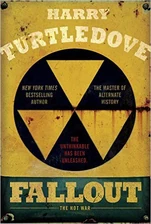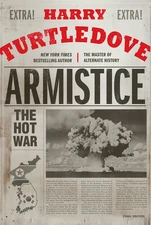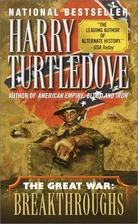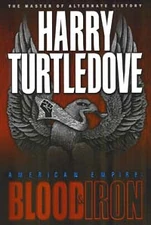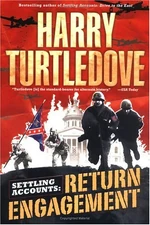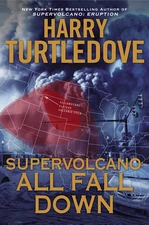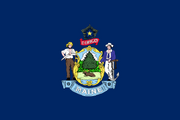
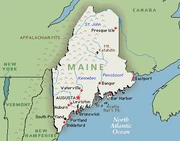
Maine is a state in the New England region of the northeastern United States, bordered by the Atlantic Ocean to the southeast, New Hampshire to the southwest, and the Canadian provinces of Quebec to the northwest and New Brunswick to the northeast. Maine is the northernmost portion of New England and is the easternmost state in the contiguous United States. It is known for its scenery — its jagged, mostly rocky coastline, its low, rolling mountains, and its heavily forested interior — as well as for its seafood cuisine, especially lobsters and clams.
The original inhabitants of the territory that is now Maine were Algonquian-speaking peoples. The first European settlement in Maine was in 1604 by a French party. The first English settlement in Maine, the short-lived Popham Colony, was established by the Plymouth Company in 1607. A number of English settlements were established along the coast of Maine in the 1620s, although the rugged climate, deprivations, and conflict with the local peoples wiped out many of them over the years. As Maine entered the 18th century, only a half dozen European settlements still survived. Patriot and British forces contended for Maine's territory during the American Revolution and the War of 1812. Maine was an exclave of Massachusetts until 1820, when as a result of the growing population and a political agreement regarding slavery, it became the 23rd state on March 15 as as a free state under the Missouri Compromise, to offset the admission of Missouri the following year in 1821 as a slave state.
Maine in "Elder Skelter"[]
Maine was threatened with invasion by the Republic of Quebec.
Maine in The Guns of the South[]
Maine remained part of the Union during the Second American Revolution.
During the 1864 presidential election, it was one of 12 states carried by incumbent Republican President Abraham Lincoln during his unsuccessful reelection campaign.[1] The state had seven electoral votes during the election.
Maine in The Hot War[]
Maine lost the city of Bangor to a Soviet atomic bomb on March 2, 1951[2]. Governor Fred Payne called out the National Guard in response.
Maine in "In the Shadow of the Great Days"[]
Twenty years earlier, the USS Constitution led a fleet against Maine pirates. The pirates proved to be a more difficult enemy since they had found a .50-caliber gun from the Great Days.[3]
Maine in Joe Steele[]
In 1936, Maine became one of the only two states (the other being nearby Vermont) to vote for Republican candidate Alf Landon. Steele nonetheless won his second term by a landslide.[4]
In 1948, the state was one of three New England states to vote for Republican candidate Harold Stassen with the other two being neighboring New Hampshire and nearby Vermont. The three New England states were some of the several to vote for Stassen, but Steele nonetheless won his fifth term by a wide margin.[5]
Literary Comment[]
In the short story "Joe Steele", Maine is one of the six states to vote for incumbent President Herbert Hoover in the 1932 election (the other five states were Connecticut, Delaware, New Hampshire, Pennsylvania and Vermont). That election is not described with that level of detail in the novel.
Maine in "Powerless"[]
Maine was part of the Northeastern Soviet Socialist Republic. A particularly brutal general secretary had worked or frozen hundreds of thousands to either exhaustion or death in the forests of Maine, among other things.[6]
Maine in Southern Victory[]
Maine had been a part of the state of Massachusetts when it broke away to form its own state in 1820. During 1838-39, a number of clashes known as the Arrostook War took place over the border between Maine and the Canadian province of New Brunswick over the exact position of the border. The end result was the Webster–Ashburton Treaty, which was not to the United Kingdom's satisfaction.
In 1881, during the Second Mexican War, a combined British and Canadian Army crossed the border from New Brunswick and invaded Maine. The invasion had two purposes, to settle the Maine and New Brunswick border once and for all, and to humiliate US President Blaine in order to bring about a quick conclusion to the war. The US Army in the region was defeated and driven south losing the upper St. John and Aroostook River valleys. As part of the peace treaty, the US was forced to relinquish this territory to Canada, thus representing the only territorial loss suffered by the United States.
In 1914, during the Great War, Maine was the launching pad for the US Army's invasion of New Brunswick, and in 1917, when Canada was occupied by the US, the lost territory was returned along with some small additional territory from New Brunswick. From this point on, Maine bordered the new Republic of Quebec.
Two U.S. Presidents called Maine home: James G. Blaine, though he was born in Pennsylvania, and Thomas Brackett Reed. Vice President Hannibal Hamlin was also from Maine. The Second Mexican War took place during Blaine's administration. The loss of part of his home state was an additional blow to his legacy.
Like the rest of New England, Maine was a politically Conservative Democratic state, voting for Calvin Coolidge in the 1928 and 1932 Presidential Elections.
Maine in Supervolcano[]
Maine was not immediately affected by the Yellowstone Supervolcano eruption. The eruption was loud enough that a loud, strong boom was heard when it reached the state.[7] The first winter after the eruption came unusually early with heavier than normal snow fall. The locals couldn't agree whether it was just one of those things or whether the supervolcano was responsible but it certainly was real.[8] It did become bad enough to block the roads north and west of the Interstate leaving that area on its own resources. With electricity out too, the residents were thrown back into the 19th century, chopping wood for heating and cooking and hunting to augment their meager staple foods.[9]
Maine in The Two Georges[]
The upper enclave of Massachusetts Province was home to a city called Portland. Settlers originating from Portland joined with Bostonian comrades to found a city in Oregon Province in the 19th century. As the flip of a shilling would have it, this city came to be named West Boston rather than West Portland.[10]
References[]
- ↑ The Guns of the South, appendices.
- ↑ Bombs Away, pg. 159, ebook.
- ↑ The Reinvented Detective, pgs. 262, 264, tpb.
- ↑ Joe Steele, pg. 137.
- ↑ Ibid., pg. 359.
- ↑ Magazine of Fantasy and Science Fiction September/October, 2018, ebook.
- ↑ Eruption, pg. 191, HC.
- ↑ Ibid, pgs. 250-251.
- ↑ Ibid, pgs. 398-403.
- ↑ The Two Georges, pg 170, MPB.


